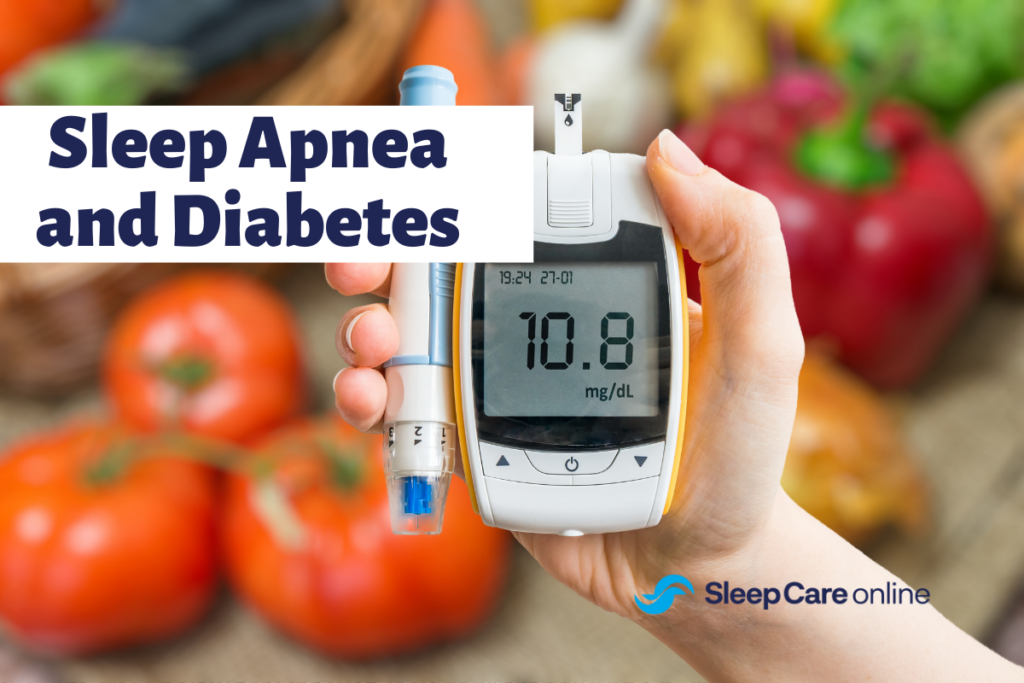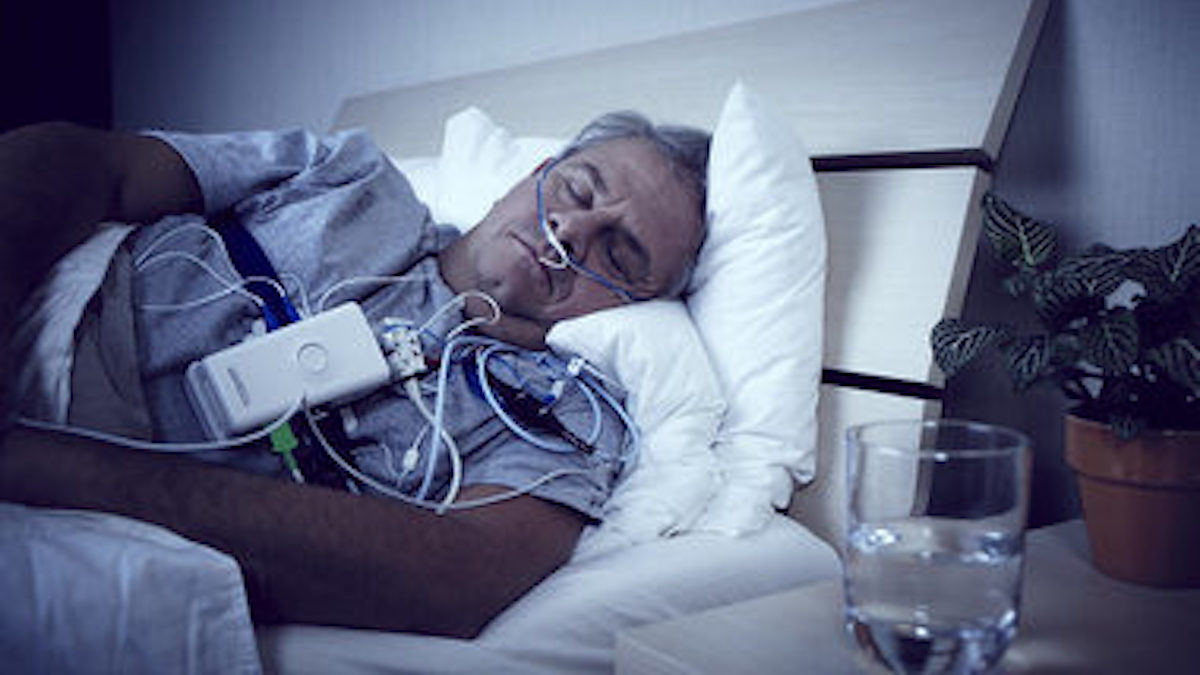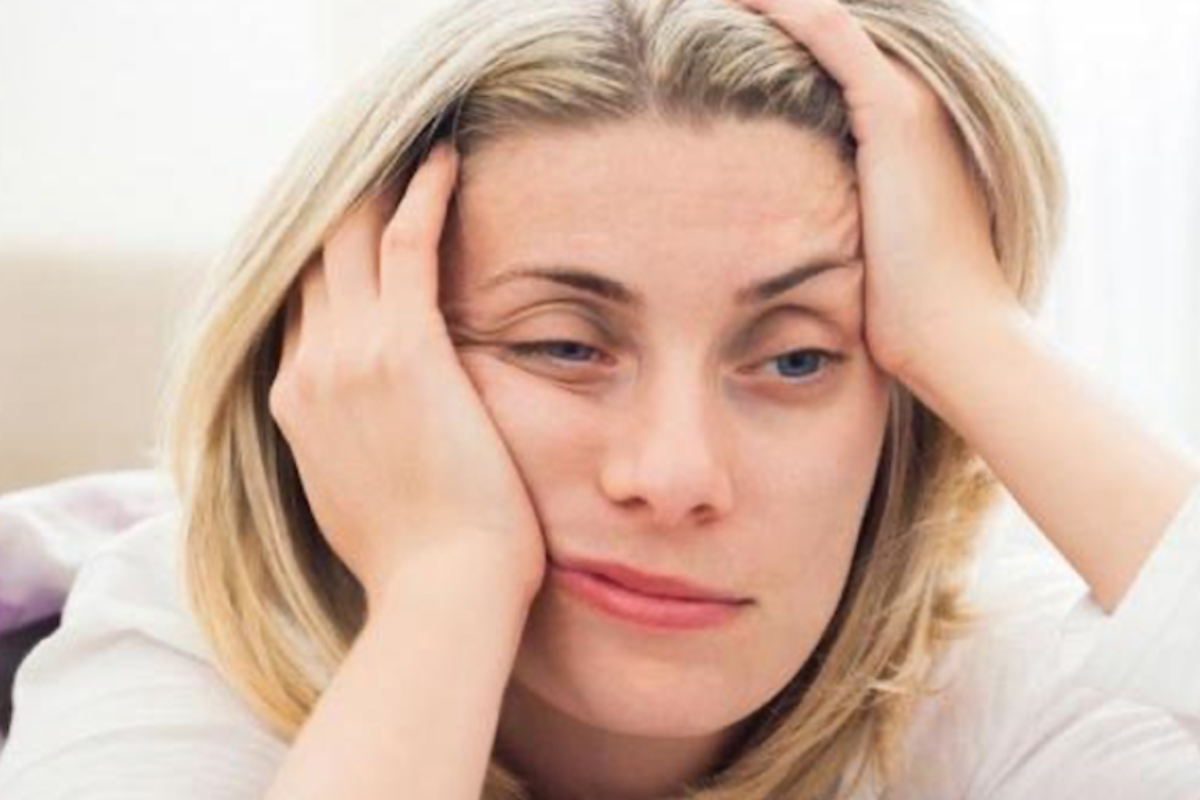Key Takeaways:
- Sleep apnea can lead to insulin resistance, which causes more sugar to build up in the bloodstream and leads to high blood sugar.
- Sleep loss from sleep apnea can also cause the body to secrete more stress hormones, which makes it harder for insulin to work effectively.
- While diabetes and sleep apnea have a strong link, CPAP therapy can improve both of these disorder’s symptoms.
The link between both healthy sleep and personal health is established, particularly when it comes to serious medical issues such as diabetes. Studies report that obstructive sleep apnea (OSA) is 71% more prevalent in patients with Type 2 diabetes. A common factor in both conditions is often obesity. While diabetic patients primarily focus on diet and exercise to manage their Type 2 diabetes, sleep quality is often overlooked.

What is Sleep Apnea?
Sleep apnea is a sleep disorder in which a person repeatedly starts and stops breathing throughout the night because of an obstruction in their airway, typically occurring when muscles in the back of the throat relax and cause the soft tissue to block the airway. An individual experiencing an apnea event may cease breathing for up to 10 seconds. In severe cases, apnea events can occur more than 30 times per hour. Most often, the individual does not even realize they are waking up gasping for air.
Symptoms of sleep apnea include: snoring, waking up gasping for air, morning headaches, daytime fatigue, and more. Risk factors such as obesity, age, and lifestyle choices can affect sleep apnea and its symptoms. Learn more about sleep apnea here.
What Is Diabetes?
Diabetes is a chronic condition that happens when the body doesn’t produce the proper amount of insulin or can’t use insulin properly. Insulin is a hormone that regulates blood sugar levels and an inefficient amount of it or when the body can’t use it properly, blood sugar levels become too high, which is known as hyperglycemia. There are 3 types of diabetes: Type 1, Type 2, and gestational.
Symptoms of diabetes include: increased thirst, frequent urination, and other illnesses like heart diseases.
Prediabetes and Type 2 Diabetes
Having prediabetes means your blood glucose (sugar) levels are higher than normal—but not high enough to be diagnosed as diabetes. Prediabetes can lead to heart disease, stroke, and type 2 diabetes, the most common form of diabetes. Prediabetes can often be reversed.
With type 2 diabetes, your body cannot properly use insulin (a hormone that helps glucose get into the cells of the body). You can get type 2 diabetes at any age, but you are at higher risk if you are older, overweight, have a family history of diabetes, are not physically active, or are a woman who had gestational diabetes.
Can Sleep Apnea Cause Diabetes?
Obstructive sleep apnea causes the airway to collapse periodically throughout the night. These periods of paused breathing, known as apnea events, disrupt deep sleep and cause an increase of carbon dioxide build-up in the blood. Sleep apnea, if left untreated, can have an increasingly negative impact on insulin resistance, elevated blood pressure, and also the risk of cardiovascular disease. All of these factors can play a part in the onset of type 2 diabetes.
How Can Diabetics Know They Have Obstructive Sleep Apnea?
Diabetic patients can look for signs of obstructive sleep apnea even before they get a diagnosis.
Symptoms of OSA include:
- Repeated nights of restless sleep
- Loud snoring
- Waking up with a sore or dry throat
- Waking up gasping or choking for air
- Morning headaches
- Grogginess or lack of energy during the day
- Poor concentration and poor memory
- Mood changes
- Reduced sex drive
Any one of these symptoms could indicate the possible presence of sleep apnea. The only way to confirm a diagnosis is via a sleep apnea test.
Can Diabetes Cause Sleep Apnea?
Type 2 diabetes is the result of increased blood sugar levels. Your pancreas cannot produce enough insulin to manage these elevated blood sugar levels, or your cells have become resistant to the insulin. While there are several number of risk factors that can cause diabetes, a common factor is obesity. Obese patients with type 2 diabetes may experience an increased risk of sleep apnea.
Why Is Sleep Apnea More Common in Type 2 Diabetes Patients?
Sleep is an important factor for overall health. When we experience continuing sleep deprivation it causes problems throughout the body, including unhealthy blood sugar levels. Sleep apnea over time can cause a chronic lack of sleep, due to frequent sleep disruptions throughout the night. This sleep loss causes less insulin to be released into your body after you eat. Your body secretes more stress hormones, which help you stay awake, but insulin cannot do its job effectively. Too much glucose stays in the bloodstream, which increases your risk of developing type 2 diabetes.
When insulin is not functioning properly, high blood sugar levels build in the body reaching a point where they can harm the eyes, kidneys, nerves, or heart. Diabetes is just one of the health problems that can arise from sleep deprivation.
Can Sleep Apnea Affect Blood Sugar Levels?
With less insulin release from sleep loss, the body experiences a spike in blood sugar levels. Sleep apnea can impact those with both Type 1 and Type 2 diabetes. But only Type 2 diabetes can actually be caused by sleep deprivation. Even with careful diet and exercise someone losing sleep chronically night after night may still see higher than normal blood sugar readings when they visit the doctor. Taking sleep into account for health is just as important as diet and exercise.
How Diabetics Can Get an Obstructive Sleep Apnea Diagnosis?
Diabetic patients can speak to their doctor about obstructive sleep apnea. Testing can either be done by spending an overnight at a sleep clinic or via a home sleep apnea test in the comfort of their bed.
With the Complete Care Package from Sleep Care online,
- Patients will fill out a brief sleep & health questionnaire at checkout
- Receive a disposable NightOwl home sleep test in the mail
- In the comfort of your own bed, take the test
- In the morning, upload your results to the cloud
- Schedule a 10-minute telehealth visit with one of our sleep practitioners to review the results
- Receive your script for PAP therapy, if warranted
Home sleep apnea tests and telehealth services are now available nationwide.
How Can You Treat Sleep Apnea?
After a patient receives a diagnosis of obstructive sleep apnea, they can get a prescription for continuous positive airway pressure (CPAP) therapy. This therapy is considered the gold standard in sleep apnea treatment as it is highly effective and also minimally disruptive. Users simply wear a CPAP mask connected to a CPAP machine while they are sleeping. The CPAP machine delivers a steady flow of pressurized air throughout the night to keep the airways open even while the user sleeps. Online retailers, like The CPAP Shop, can provide affordable CPAP equipment without the hassle of dealing with your insurance company.
When apneas no longer jolt the user up multiple times throughout the night, the CPAP user enjoys a deep and healthy nightly sleep. Restful sleep is an important component of the healthy management of Type 2 diabetes.
It is important to note that sleep apnea was also found to be prevalent in those with prediabetes, a condition that may lead to Type 2 diabetes.1 If you are pre-diabetic, or believe you may be and are experiencing the symptoms of sleep apnea, ask about sleep testing.
What Are the Effects of Sleep Apnea Treatments on Diabetes?
While sleep apnea treatments are not a cure for Type 2 diabetes, they can help diabetics maintain a healthy blood sugar level as part of a healthy routine that also includes proper diet exercise, and medications prescribed by your doctor.
Sleep apnea treatments can help diabetics begin to receive the healthy sleep they need that was being taken away by disruptive sleep apnea.
With proper treatment and CPAP compliance, diabetic patients may start to feel healthier and more awake in the morning. They may begin to see their blood sugar spikes occur less frequently.
Other symptoms of sleep apnea may also start to disappear such as dry mouth in the morning or morning headaches, irritability, moodiness, depression, and daytime drowsiness.
How to Manage Diabetes with Sleep Apnea?
Many patients with diabetes and sleep apnea can effectively manage both. Diabetics can rely on the help of their doctor to develop a healthy exercise routine and healthy diet to maintain blood sugar levels in the normal range. Diabetics may also have to take prescription medications to help manage their diabetes, whether it be Type 1 or Type 2.
For sleep apnea, diabetics can maintain consistent sleep patterns every night and follow their CPAP prescription. Staying CPAP compliant helps keep their airway open every night while they sleep so they can get the healthy sleep they need.
Managing sleep apnea also involves making other healthy choices such as avoiding alcohol, heavy meals before bedtime, and smoking. These can also have a healthy impact on the management of diabetes.
Taking a focused effort in managing sleep apnea is one of the best ways sleep apnea patients can ensure better and healthier sleep every night. That means making sure to use their CPAP machine as prescribed and checking with their doctor to determine if pressure settings need to be adjusted to meet changing sleep apnea needs.
Use Sleep Trackers to Analyze Your Sleep Quality
One way many sleep apnea patients keep tuned into their sleep quality is with sleep trackers. Sleep trackers can help you see when you are losing sleep and when you are achieving the highest level of quality sleep at night.
A wide variety of sleep trackers have hit the market, with more being released all the time. Many are wearable trackers that you can strap to your wrist. Others clip on your pillow or sit on your bedside table.
Most sleep trackers measure sleep quantity and quality by using accelerometers, and small motion detectors. Accelerometers measure how much movement you’re making while you sleep. This data is then analyzed using an algorithm to estimate sleep time and quality. If you want to get more details about your sleep stages, a sleep tracker that only offers an accelerometer isn’t the best fit, they can’t accurately measure sleep stages because there is little difference in movement between the sleep stages, according to the Sleep Foundation.
If you are ready to find out if you have sleep apnea, purchase our Complete Care Package today! Still, have questions? Simply give us a call at 866-465-4478 or email us at [email protected].




